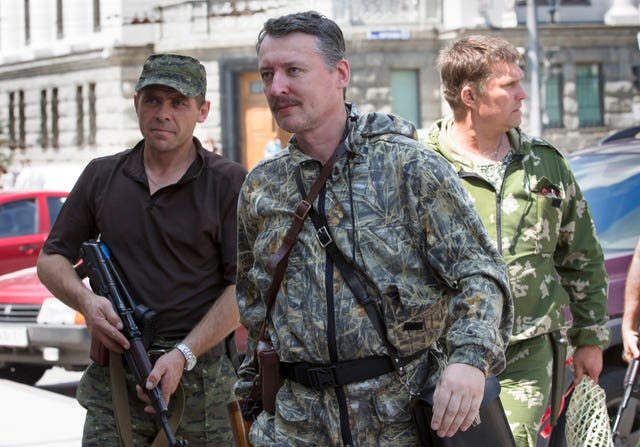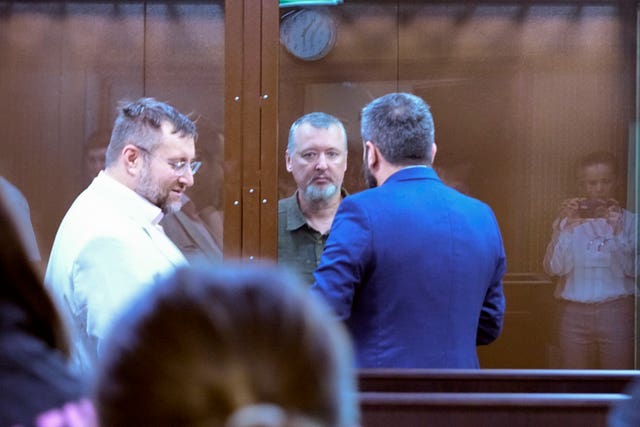A prominent Russian hard-line nationalist who accused President Vladimir Putin of weakness and indecision in Ukraine was detained on Friday on charges of extremism.
It is seen as a signal the Kremlin has toughened its approach with critics after last month’s abortive rebellion by the Wagner mercenary company.
Igor Strelkov, a retired security officer who led Moscow-backed separatists in eastern Ukraine in 2014 and also was implicated by the Netherlands in the downing of a Malaysia Airlines passenger jet that year, has argued that a total mobilisation is needed for Russia to achieve victory.
He recently criticised Mr Putin as a “nonentity” and a “cowardly mediocrity”.

The detention of Strelkov, 52, whose real name is Igor Girkin, was reported by his wife, who posted the news on his messaging app channel.
She said he apparently faces charges of extremism. Strelkov’s lawyer Alexander Molokhov confirmed his detention to the official Tass and RIA Novosti news agencies, but did not elaborate.
The Interfax news agency cited Moscow’s Meshchansky District Court as saying it was set to rule on investigators’ request to put Strelkov behind bars pending his inquiry. He is accused of making calls for extremist activities, which carries up to five years in prison if he is convicted.
Moscow’s Meshchansky District Court ordered Strelkov to be held in custody for two months pending a probe on charges of making calls for extremist activities.
The move comes nearly a month after a short-lived mutiny launched by mercenary chief Yevgeny Prigozhin that saw his Wagner troops capture military headquarters in the southern city of Rostov-on-Don and then drive as close as 200 kilometres (125 miles) to Moscow to demand the ousting of Russia’s top military leaders.
Mr Prigozhin agreed to end the June 23-24 rebellion under a deal that offered an amnesty to him and his mercenaries and allowed them to move to Belarus.
The revolt posed the most serious threat to Mr Putin’s 23-year rule, eroding his authority and exposing government weakness.
Like Mr Prigozhin, Strelkov harshly criticised Russia’s military leaders for incompetence, but he also denounced the Wagner’s chief and described his action as treason and a major threat to the Russian state.

The two had repeatedly traded insults, and Strelkov’s supporters said a criminal inquiry into his statements has been initiated by one of Wagner’s mercenaries.
Strelkov has over 875,000 subscribers on his messaging app channel.
The Club of Angry Patriots, a recently created hard-line group he belonged to, issued a statement protesting against his detention as a “provocation” that “undermines the population’s trust in law enforcement organs” and “carries extremely negative consequences for the country’s stability”.
Strelkov served in the Russian military during the Chechen separatist wars and later joined the country’s top domestic security agency, the Federal Security Service where he reached the rank of colonel.
After he retired from service, he took part in Moscow’s annexation of Ukraine’s Crimean Peninsula and then led fighters in eastern Ukraine during the first months of a Moscow-backed separatist rebellion there in 2014.
Last year, a Dutch court convicted him and two other men of murder for their role in shooting down a Malaysia Airlines passenger jet with a Russian surface-to-air missile, killing all 298 people aboard the aircraft as it flew over a separatist-controlled region of eastern Ukraine on July 17, 2014.
They were convicted for their role in bringing the Buk air defence missile system from a Russian military base into Ukraine and putting it into position for its launch.
The Dutch Public Prosecution Service said it was watching the developments “with interest, although we cannot verify what is going on”.
“We would, of course, like nothing more than for this man, who has been sentenced to life imprisonment in the Netherlands, to serve his prison sentence here. The victims of MH17 and their relatives deserve that,” the statement said.
“But the fact is that Russia does not extradite its citizens, and this event unfortunately does not bring that any closer.”
Strelkov, whose adopted name is rooted in the word “shooter”, had a penchant for war history and was among Russians who take part in military reenactments, appearing in the uniform of an imperial Russian officer from the First World War and toting historic weapons.
Amid the fighting in Ukraine, he has mocked Russian Defence Minister Sergei Shoigu as a “plywood marshal”, an apparent reference to Mr Shoigu’s hobby of woodcutting.
Strelkov has long spoken with contempt about Mr Putin, accusing him of incompetence and kowtowing to Western interests, and he toughened his criticism after the start of Moscow’s action in Ukraine.
He predicted Russia would face imminent defeat because of Mr Putin’s reluctance to declare a massive mobilisation and put the country on full military footing.
“A lot of empty talk, the minimum of action and the utter lack of responsibility for failures — that is Putin’s style of late,” Strelkov said recently.
“A nonentity that has managed to cheat a large part of the population has been at the country’s helm for 23 years.”
He warned that “the country will not survive another six years under the rule of that cowardly mediocrity”, a reference to Mr Putin’s expected bid to run for another six-year term in a presidential vote in March 2024.
Tatiana Stanovaya, a senior fellow at the Carnegie Russia Eurasia Centre, said Wagner’s rebellion has given the military brass an opportunity to go after its critics.
“Strelkov had overstepped all conceivable boundaries a long time ago, sparking the desire among security forces — from the FSB to military chiefs — to apprehend him,” she said on Twitter. “This is a direct outcome of Prigozhin’s mutiny: the army’s command now wields greater political leverage to quash its opponents in the public sphere.”
She predicted that while “it’s unlikely that there will be massive repressions against ‘angry patriots’, … the most vehement dissenters may face prosecution, serving as a cautionary tale for others”.




Why are you making commenting on The Herald only available to subscribers?
It should have been a safe space for informed debate, somewhere for readers to discuss issues around the biggest stories of the day, but all too often the below the line comments on most websites have become bogged down by off-topic discussions and abuse.
heraldscotland.com is tackling this problem by allowing only subscribers to comment.
We are doing this to improve the experience for our loyal readers and we believe it will reduce the ability of trolls and troublemakers, who occasionally find their way onto our site, to abuse our journalists and readers. We also hope it will help the comments section fulfil its promise as a part of Scotland's conversation with itself.
We are lucky at The Herald. We are read by an informed, educated readership who can add their knowledge and insights to our stories.
That is invaluable.
We are making the subscriber-only change to support our valued readers, who tell us they don't want the site cluttered up with irrelevant comments, untruths and abuse.
In the past, the journalist’s job was to collect and distribute information to the audience. Technology means that readers can shape a discussion. We look forward to hearing from you on heraldscotland.com
Comments & Moderation
Readers’ comments: You are personally liable for the content of any comments you upload to this website, so please act responsibly. We do not pre-moderate or monitor readers’ comments appearing on our websites, but we do post-moderate in response to complaints we receive or otherwise when a potential problem comes to our attention. You can make a complaint by using the ‘report this post’ link . We may then apply our discretion under the user terms to amend or delete comments.
Post moderation is undertaken full-time 9am-6pm on weekdays, and on a part-time basis outwith those hours.
Read the rules hereLast Updated:
Report this comment Cancel